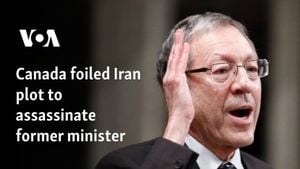With Donald Trump poised to take back the White House and Republicans likely to control both the House and Senate, we stand at the edge of significant shifts at the federal level. The potential impacts of such governance could be monumental, affecting everything from immigration policy to the structure of federal agencies.
Trump's administration promises aggressive moves to reshape the government, attempting to solidify his influence following the successes of his previous term. Having appointed 226 federal judges and three Supreme Court justices, Trump's judicial legacy appears to be more resilient now than ever, offering him and the Republican party significant leverage.
One of the first orders of business for Trump and the GOP is likely to be immigration reform. During his first presidency, Trump made headlines with his unwavering stance on immigration, initiating border policies emphasizing strict enforcement. Having garnered greater congressional control this time around, analysts argue this presents Trump with the opportunity to implement more drastic measures, like mass deportations and altering sanctuary cities’ regulations.
Alongside this focus on immigration, Trump is also expected to renew efforts to dismantle the Affordable Care Act (often referred to as Obamacare). Since its inception, the Affordable Care Act has represented one of the most significant milestones of the Obama administration, providing health insurance to millions of Americans. Advocates for healthcare reform fear these repeals could leave many without necessary medical coverage.
Equally of concern is Trump's proposition to cut federal spending radically. He has reportedly partnered with prominent figures like Elon Musk to form the "Department of Government Efficiency," aimed at downsizing federal agencies significantly. Musk has suggested the possibility of slashing up to $2 trillion from the annual $7 trillion federal budget, which would likely result in deep cuts across various government sectors. While these goals may cater to fiscal conservatives, many public service advocates worry about the repercussions of such actions on service availability.
Experts also foresee moves to challenge and potentially bypass established laws, such as the Impoundment Control Act. Trump has recently expressed intentions to contest this law, which mandates the president to spend congressional appropriations as intended. By claiming the act is unconstitutional, he may provoke lengthy legal battles and disrupt governmental norms.
Federal workers' conditions could also undergo tumultuous changes should Trump implement his strategies from the past. The potential for firing or relocating numerous federal employees looms large. Historical precedents indicate previous efforts to decentralize jobs, such as moving the Bureau of Land Management from Washington D.C., leading to mass resignations. If pursued again, similar strategies could see many qualified workers leaving the public sector, driven out by challenging work conditions.
Others within Trump's camp propose outsourcing significant government roles to private sectors. This approach raises red flags for accountability, with critics worrying about transparency when it involves public interests. Hiring private investigators for federal background checks bypasses traditional vetting processes, potentially leaving security vulnerabilities unattended.
The anticipated dominance of the Republican party won't come without its challenges. While many conservatives support Trump's vision, moderate Republicans and some members of the Senate may resist his more extreme proposals. For example, new Senate majority leader John Thune did not explicitly align himself with Trump’s more controversial initiatives and indicated a willingness to act independently of the former president's direct influence.
One of the greatest barriers to achieving a cohesive strategy may be the filibuster, which requires legislation to surpass the 60-vote threshold. Even with strong Republican majorities, Trump cannot assume every agenda item will pass smoothly through the Senate. Historical patterns show how quickly such trifectas can dissolve, leading to split control and potential policy changes.
On the social front, political movements are also expected to surface strongly as counter-responses to Republican rule. Unions are gearing up for battles against potential rollbacks of federal worker protections, chiefly aiming their efforts against the anticipated cuts and reorganizations suggested during Trump's administration. Grassroots organizations and advocacy groups are expected to mobilize protests against the GOP's proposed immigration policies and the restructuring of healthcare legislation.
Economic forecasts suggest turbulent times might lay ahead. Many experts predict the potential consequences of mass deportations, which could disrupt labor markets. Such actions could lead to significant economic impacts, including the possibility of recession if lawful and undocumented workers are removed from the workforce en masse. On the flip side, others believe cuts to federal programs may lead to budget relief, igniting debates on fiscal responsibility versus humanitarian concerns.
Overall, as Trump prepares to assume office with Republican control across all branches of government, the developments may lead to sweeping changes across many aspects of governance. The repercussions of these changes will likely play out not just over the next few months but will have lasting impressions shaped by the priorities set forth by the administration and the pushback from both dissenting political factions and grassroots activists.



